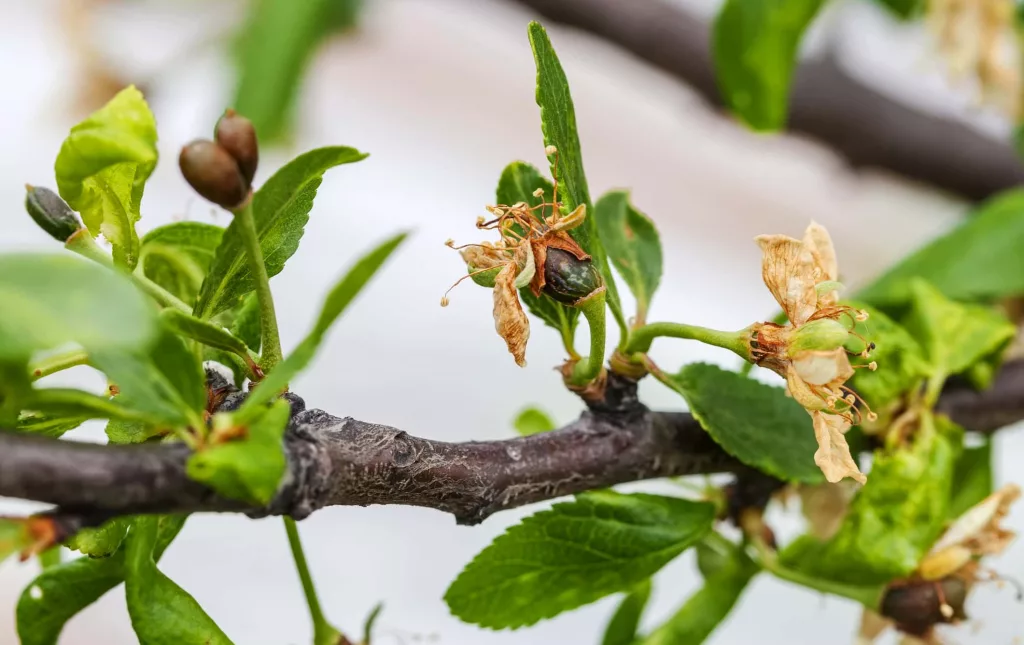The vagaries of farm life are tough enough to take on any given day, but when Mother Nature delivers the truly unkind blow of a hard spring freeze in Michigan’s Great Southwest, the results can be devastating. Early indications are that such is the case following an icy cold weekend across the region.
Michigan State University Extension Small Fruit Educator Mark Longstroth becomes the bearer of the bad news, telling Farm Service Agency directors in Allegan, Berrien and Van Buren Counties that this past weekend’s freeze event dropped area temperatures to the lower 20s and “severely damaged most fruit crops in the region.”
Longstroth says he expects moderate to severe damage for all fruit crops following the freeze, adding, “This area was hurt badly, but we were the coldest area in the state, and other areas were not as far along and will have suffered less damage.” That was Longstroth’s email message to Michigan Farm News, adding, “I will be out looking at apples, blueberries, and grapes this morning, and I expect to see damage in all of them.”
Longstroth went on to write, “The coldest temperatures were in the region east of Benton Harbor and west of Kalamazoo (20 to 26 degrees Fahrenheit),” and notes, “There were warmer temperatures both to the north and south. Areas close to Lake Michigan were warmer than interior sites. There was a weak inversion. There seemed to be a two-degree difference between high and low sites in the region. Some growers used wind machines and irrigation to prevent damage to their crops.”
Longstroth had already inspected live and dead apples, grapes and plums in Southwest Michigan. Growers, he added, will continue to assess damages throughout the week.
As crop insurance specialists for Farm Bureau Insurance, Ryan Fox in West Michigan, and Brenda Szach in Northwest Michigan, said “significant” damage occurred in their coverage areas.
Szach says, “We froze for at least two to three hours on the west side on Friday night, and I’m sure Saturday night too,” and adds, “Most of our clients are trying to assess damages in orchards today and tomorrow. Clients in Van Buren County were hit with at least seven hours of freezing temperatures.”
Fox said damages occurred for crops farther away from Lake Michigan, warning, “The cherries got hurt, especially the farther away from the lake you are,” and adds, “It got really, really cold. Growers are cutting into clusters and seeing some black ones and some not. We don’t know how much of a crop is there.”
Elsewhere, Dawn Drake, general manager of Michigan Agricultural Cooperative Marketing Association’s Apple Division, said apple damage varied regionwide.
She says, “It sounds very bad in Southwest Michigan,” adding, “It’s too early to tell the extent as we need warmer temperatures to actually see it. We are expecting another freeze tonight but should have a better handle on it Wednesday or Thursday.”
For the most part, the frost fans didn’t work, which made Michael DeRuiter and his crew’s weekend all-nighter a fruitless one near Hart along Lake Michigan in Oceana County. Still, the veteran apple and cherry grower ventured out Saturday to his orchards, where he found black-and-brown pistils following the freeze event.
Other farms across West Michigan met a similar fate, according to DeRuiter, who serves as District 7 director of the Michigan Farm Bureau, representing farmers from Montcalm, Muskegon, Newaygo, Oceana, and Osceola counties.
DeRuiter told Michigan Farm News, “We are cutting buds in order to get a view of the pistil, the female part,” noting, “Some of the lake guys are guessing a 40-percent to 50-percent crop, which I believe because they were a little warmer. When you move to the Hart area, we are staring at a third of a crop for cherries. Apples are variable. You get out to Elbridge Township, and it’s a goose egg (for cherries). I am cutting buds out there, and I can’t find a viable cherry bud at all.” He adds, “It’s a smoke job out in Elbridge.”
Temperatures dipped Saturday into the low-20s, according to DeRuiter, noting the low in Oceana County reached 25 degrees. He says, “Typically, you get a few degrees, and you hope your fans warm up the area,” adding, “There was maybe a degree or two of inversion, but from the farmers I talked to, the consensus was the fans didn’t do a whole lot of good with that particular situation.”
The May freeze is just another form of bad news for Michigan tart cherry growers, according to DeRuiter, given the failed dumping lawsuit against Turkey and already poor commodity prices. He says, “Even at 100-percent crop, tart cherry growers are struggling to pay bills,” and concludes, “Say you get 30-percent of a crop, what percentage is going to get abandoned? If you can’t afford to grow 100-percent of a crop, how in God’s green earth are you going to afford to operate on a third of the income? I’ve talked to some growers, and they are trying to see if it’s worth it for them to keep spraying the current crop or keep leaves on the trees and call it a day.”
The freeze damaged plum blossom in the photo accompanying this story on Moody on the Market is for illustration purposes only and is not an actual bloom from this weekend’s event.






